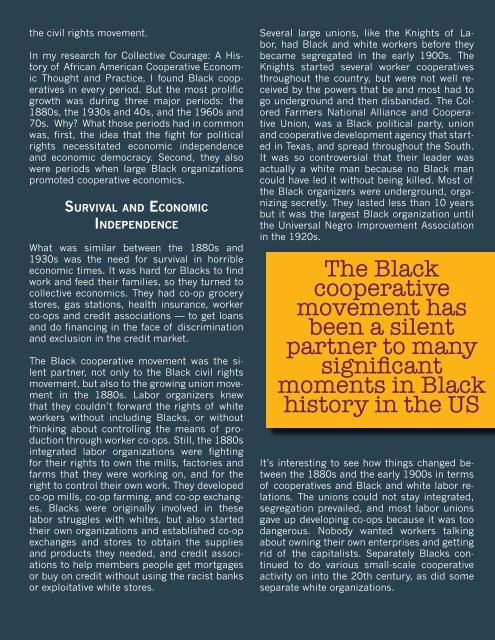GRIOTS REPUBLIC - AN URBAN BLACK TRAVEL MAG - SEPTEMBER 2016
September's issue is all about GLOBAL FOOD! Black Travel Profiles include Celebrity Chef Ahki, Soul Society's Rondel Holder, Dine Diaspora and Airis The Chef.
September's issue is all about GLOBAL FOOD! Black Travel Profiles include Celebrity Chef Ahki, Soul Society's Rondel Holder, Dine Diaspora and Airis The Chef.
You also want an ePaper? Increase the reach of your titles
YUMPU automatically turns print PDFs into web optimized ePapers that Google loves.
the civil rights movement.<br />
In my research for Collective Courage: A History<br />
of African American Cooperative Economic<br />
Thought and Practice, I found Black cooperatives<br />
in every period. But the most prolific<br />
growth was during three major periods: the<br />
1880s, the 1930s and 40s, and the 1960s and<br />
70s. Why? What those periods had in common<br />
was, first, the idea that the fight for political<br />
rights necessitated economic independence<br />
and economic democracy. Second, they also<br />
were periods when large Black organizations<br />
promoted cooperative economics.<br />
Survival and Economic<br />
Independence<br />
What was similar between the 1880s and<br />
1930s was the need for survival in horrible<br />
economic times. It was hard for Blacks to find<br />
work and feed their families, so they turned to<br />
collective economics. They had co-op grocery<br />
stores, gas stations, health insurance, worker<br />
co-ops and credit associations — to get loans<br />
and do financing in the face of discrimination<br />
and exclusion in the credit market.<br />
The Black cooperative movement was the silent<br />
partner, not only to the Black civil rights<br />
movement, but also to the growing union movement<br />
in the 1880s. Labor organizers knew<br />
that they couldn’t forward the rights of white<br />
workers without including Blacks, or without<br />
thinking about controlling the means of production<br />
through worker co-ops. Still, the 1880s<br />
integrated labor organizations were fighting<br />
for their rights to own the mills, factories and<br />
farms that they were working on, and for the<br />
right to control their own work. They developed<br />
co-op mills, co-op farming, and co-op exchanges.<br />
Blacks were originally involved in these<br />
labor struggles with whites, but also started<br />
their own organizations and established co-op<br />
exchanges and stores to obtain the supplies<br />
and products they needed, and credit associations<br />
to help members people get mortgages<br />
or buy on credit without using the racist banks<br />
or exploitative white stores.<br />
Several large unions, like the Knights of Labor,<br />
had Black and white workers before they<br />
became segregated in the early 1900s. The<br />
Knights started several worker cooperatives<br />
throughout the country, but were not well received<br />
by the powers that be and most had to<br />
go underground and then disbanded. The Colored<br />
Farmers National Alliance and Cooperative<br />
Union, was a Black political party, union<br />
and cooperative development agency that started<br />
in Texas, and spread throughout the South.<br />
It was so controversial that their leader was<br />
actually a white man because no Black man<br />
could have led it without being killed. Most of<br />
the Black organizers were underground, organizing<br />
secretly. They lasted less than 10 years<br />
but it was the largest Black organization until<br />
the Universal Negro Improvement Association<br />
in the 1920s.<br />
The Black<br />
cooperative<br />
movement has<br />
been a silent<br />
partner to many<br />
significant<br />
moments in Black<br />
history in the US<br />
It’s interesting to see how things changed between<br />
the 1880s and the early 1900s in terms<br />
of cooperatives and Black and white labor relations.<br />
The unions could not stay integrated,<br />
segregation prevailed, and most labor unions<br />
gave up developing co-ops because it was too<br />
dangerous. Nobody wanted workers talking<br />
about owning their own enterprises and getting<br />
rid of the capitalists. Separately Blacks continued<br />
to do various small-scale cooperative<br />
activity on into the 20th century, as did some<br />
separate white organizations.














